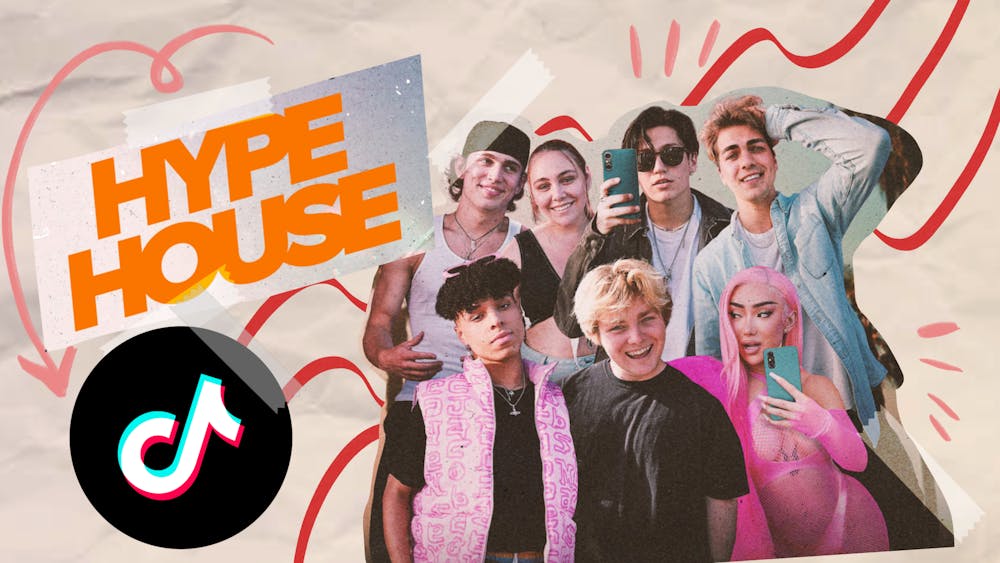Just last year, being in the Hype House—a $5 million content house that once housed social media superstars such as Charli D’Amelio and Addison Rae—seemed like a teenager’s wildest dreams. From living with young, attractive, and successful influencers to being given the opportunity to work with up–and–coming social media stars, the allure and clout of the Hype House was simply unquestionable. In fact, Hype House–adjacent influencer Nikita Dragun described it best: the Hype House is “a fraternity filled with people who have millions of followers and dollars at their fingertips with high school drama and like… a ring light.”
But despite the initial glitz of this content house, Netflix docuseries Hype House shows that after these influencers’ five seconds of fame, the reality of being a social media star is darker than it seems.
Hype House opens with shots of fancy cars, sunny California weather, and the colossal Hype House mansion broken up by close–ups of members listing the size of their absurdly large followings. But in spite of their glamorous Hollywood lifestyles, these young influencers seem almost numb to the level of fame they have achieved. “Do I think I’m famous?” Chase Hudson, a 19–year old influencer, singer, and Hype House co–founder with over 32.5 million TikTok followers as of January, asks himself. “I think I have a sprinkle of fame,” he muses.
Hudson’s nonchalant attitude towards his fame and his content house is one of the main plotlines of the show. It seems clear that Hudson has moved onto bigger and better things—he’s moved out of the Hype House and has started to pursue a career in music. Thomas Petrou, another co–founder of the Hype House, is disappointed to see one of the house’s most popular creators make less and less content to keep the collective afloat, saying, “Chase just wants to reap the benefits of the business without doing anything to help us make any of the money.”
Not only this; the show spotlights influencer couple Alex Warren and Kouvr Annon’s tumultuous relationship, which climaxes in an almost tragic scene where Warren convinces Annon to hold a fake wedding to generate more likes on his Youtube channel. Annon is obviously distraught, as she wants to marry Warren in real life and feels that their internet followings are often prioritized over their actual relationship.
Similarly, TikTok heartthrob Vinnie Hacker, who’s known for his thirst–trap videos, is shown to struggle with balancing his sexualized internet persona with his nerdy, video game–obsessed personality. Faced with thirsty demands from increasingly aggressive fans, all he wants to do is settle down and become a Twitch streamer.
Despite the trials and tribulations each Hype House member faces, Petrou’s story is one of the saddest to watch. Throughout the show, it becomes increasingly clear that Petrou’s investment and near–obsession with Hype House finances is motivated by his fear of returning to his difficult upbringing. He calls multiple group meetings regarding a lack of content on the Hype House TikTok page, and is constantly frustrated that other members in the house refuse to contribute to the collective.
At the end of the series, Petrou reveals that one of his major fears has been realized—a majority of the most popular members have moved out and have begun to focus on other career ventures, leaving him and his content house behind. In the last episode, he says dejectedly, “I just keep seeing friends leave, and I ask myself: ‘Why am I doing this?’” With this mass departure, the inevitable breakdown of the Hype House has finally begun.
After the show’s conclusion, it seems clear that the life of a Hype House member isn’t as flashy and exciting as the content house's branding makes it out to be. Ultimately, Hype House and the stories of the influencers that it follows aren’t just sad—they’re also incredibly boring. Contrary to what the show advertises, the drama isn’t composed of the petty fights that characterize most reality TV. In fact, most of the drama in the show is caused by either Petrou’s stress about maintaining his fame or other members of the Hype House engaging in ludicrous tasks to increase their following. In the end, the Hype House isn’t the crazy frat that Dragun purports—it’s merely a business run by overwhelmed young adults fresh out of adolescence.
The bottom line of Hype House is that the life of an influencer is simply miserable. Members of the content house are burnt out, stressed, and constantly fear what their fans think of them. Despite the superficiality of content houses in the first place, Hype House shows us that the frivolousness of influencer culture is what makes fame so precarious.
While likes, followers, and subscribers mean absolutely nothing in the long run, influencers’ financial stability hinges on the internet’s need for immediate entertainment and gratification. But at the same time, this constant influx of attention negatively impacts their psyche, mental health, and perceptions of themselves and others. The main question that Hype House raises ultimately highlights the meaninglessness of social media stardom: what’s the point of being famous if nothing you do can make you happy?
After watching Hype House, it becomes clear that influencer fame is nothing but a losing game. While many aspire to become viral overnight, the stars of Hype House show that their social media performances lack any sort of meaning and fail to bring them joy. Despite the Hype House existing to create a living space full of like–minded people, each influencer in Hype House is, at the end, undoubtedly alone.

